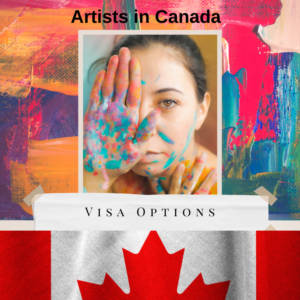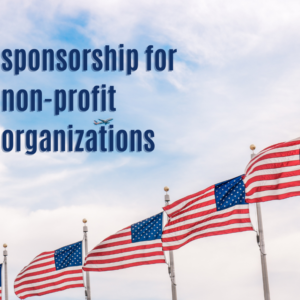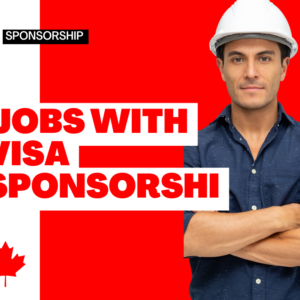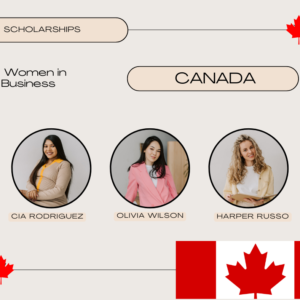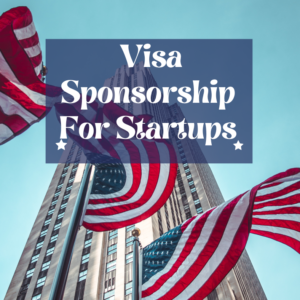US Visa Sponsorship Opportunities for Immigrants. The United States has long been a beacon of hope for immigrants seeking better opportunities, a higher quality of life, and the freedom to pursue their dreams. One of the essential steps in making this dream a reality is securing a visa. For many, this process involves obtaining U.S. visa sponsorship.
Understanding the various sponsorship opportunities available can make a significant difference in navigating the complex U.S. immigration system. In this article, we’ll explore the different types of U.S. visa sponsorship opportunities for immigrants, providing a comprehensive guide to help you on your journey.
Employment-Based Visa Sponsorship
H-1B Visa
The H-1B visa is one of the most sought-after employment-based visas. It allows U.S. employers to hire foreign professionals in specialty occupations, such as IT, engineering, and healthcare. The key requirements include having a job offer from a U.S. employer and possessing a bachelor’s degree or higher in the relevant field.
L-1 Visa
The L-1 visa is designed for intra-company transferees who work in managerial positions or have specialized knowledge. It allows multinational companies to transfer employees from their foreign offices to their U.S. offices. This visa is particularly beneficial for large corporations with a global presence.
EB-2 and EB-3 Visas
The EB-2 and EB-3 visas are part of the employment-based immigration category. The EB-2 visa is for professionals with advanced degrees or exceptional ability, while the EB-3 visa is for skilled workers, professionals, and other workers. These visas often require labor certification from the Department of Labor to ensure that hiring the foreign worker will not negatively impact U.S. workers.
Family-Based Visa Sponsorship
Immediate Relative Immigrant Visas
U.S. citizens can sponsor their immediate relatives, including spouses, parents, and unmarried children under 21, for immigrant visas. These visas are not subject to annual numerical limits, making the process relatively quicker compared to other family-sponsored visas.
Family Preference Immigrant Visas
These visas are for more distant family relationships with a U.S. citizen and some specified relationships with a Lawful Permanent Resident (LPR). Categories include unmarried adult children, married children, and siblings of U.S. citizens. Unlike immediate relative visas, these are subject to annual numerical limits, leading to longer wait times.
Diversity Visa Lottery
The Diversity Visa (DV) Lottery program provides another pathway for immigrants from countries with historically low rates of immigration to the U.S. Each year, 50,000 visas are randomly allocated to applicants who meet strict eligibility requirements. Winners of the lottery can apply for permanent residency.
U.S. Visa Sponsorship Opportunities for Immigrants
The United States, a land of opportunity, beckons skilled professionals and yearning families alike. But securing your spot can be tricky. Fear not, immigrant dreamer! This guide unveils the two main paths to U.S. visas through sponsorship:
Pathway 1: Reuniting with Loved Ones (Family-Based Sponsorship)
- Who Sponsors? U.S. citizens or lawful permanent residents (green card holders) can vouch for you.
- Who Qualifies? Spouses, unmarried children under 21 (for U.S. citizens only), and even parents (for U.S. citizens only) can be sponsored for immigration.
- The Deal: This heartwarming route allows families to reunite. However, be prepared for a wait – it’s a marathon, not a sprint.
Pathway 2: Landing Your Dream Job (Employment-Based Sponsorship)
- Who Sponsors? U.S. companies seeking skilled foreign workers can become your sponsor.
- In-Demand Skills? Tech wizards, healthcare heroes, business gurus with ingenious ideas – if your skills are hot in the U.S. job market, you’re in luck!
- Visa Options: H-1B visas for specialty occupations, L-1 visas for intra-company transfers, and more are available depending on your expertise.
- The Pace: This path can be faster than family-based sponsorship, but you’ll need to be a highly sought-after talent to grab a sponsor’s attention.
Remember, There’s More to the Story!
These are just the cornerstones. Depending on your unique situation and qualifications, there might be other visa sponsorship options out there.
Here’s Your Action Plan:
- Explore: Dive deeper into the U.S. Citizenship and Immigration Services (USCIS) website (https://www.uscis.gov/) for a comprehensive breakdown of visa categories.
- Consider Legal Guidance: An immigration attorney can assess your eligibility and recommend the most suitable visa option for you, navigating the complexities of the process.
- Don’t Give Up: Finding your perfect U.S. visa sponsorship path might take some effort. But with research, determination, and maybe even some legal help, you can unlock the door to your American dream.
So, are you ready to embark on your U.S. visa sponsorship journey? With the right knowledge and resources, you can turn your dream into a reality. Good luck!
What is Visa Sponsorship?
Visa sponsorship, in the context of the United States, refers to the process where a U.S. citizen, lawful permanent resident (green card holder), or company agrees to take responsibility for a foreign national’s visa application. This sponsorship signifies that the sponsor will support the applicant while they reside in the U.S. There are two main types of sponsorship:
1. Family-Based Sponsorship:
- Who Sponsors? U.S. citizens or green card holders can sponsor close family members.
- Who Qualifies? Spouses, unmarried children under 21 (for U.S. citizens only), and even parents (for U.S. citizens only) can be sponsored for immigration.
- The Purpose: This route allows families to reunite and live together in the U.S.
2. Employment-Based Sponsorship:
- Who Sponsors? U.S. companies seeking skilled foreign workers can sponsor them for work visas.
- Who Qualifies? Workers with skills in high demand within the U.S. This could be in fields like STEM (Science, Technology, Engineering, Math), healthcare, or business specialties.
- The Purpose: Companies can address labor shortages by sponsoring skilled foreign workers they can’t find domestically.
Key Points to Remember:
- The sponsorship process can be complex and lengthy.
- Each visa category has specific eligibility requirements for both the sponsor and the applicant.
- U.S. Citizenship and Immigration Services (USCIS) oversees the entire visa sponsorship process. You can find information on all types of visas and the process on their website: https://www.uscis.gov/.
- Consulting with an immigration attorney is highly recommended. They can guide you through the complexities of the process, ensure your application is complete, and advise you on the best visa option for your situation.
Who is Eligible For Visa Sponsorship?
Eligibility for visa sponsorship in the U.S. depends on the type of sponsorship you’re looking at:
Family-Based Sponsorship:
- Who Can Sponsor: U.S. citizens or lawful permanent residents (green card holders) can sponsor certain close family members.
- Who Can Be Sponsored:
- Spouses
- Unmarried children under 21 years old (for U.S. citizens only)
- Parents (for U.S. citizens only)
Employment-Based Sponsorship:
- Who Can Sponsor: U.S. companies can sponsor foreign workers for temporary work visas. There are specific requirements for companies to be eligible as sponsors, such as demonstrating a legitimate need for the foreign worker’s skills and proving they’ve attempted to recruit U.S. citizens first.
- Who Can Be Sponsored: Workers with skills that are in high demand in the U.S. This could be in fields like:
- STEM (Science, Technology, Engineering, Math)
- Healthcare
- Business specialties
Additional Considerations:
- Specific Visa Categories: Within employment-based sponsorship, there are various visa categories with their own eligibility requirements. For instance, the H-1B visa is for specialty occupations requiring a university degree, while the L-1 visa is for intra-company transfers of managers or specialized knowledge workers.
- Individual Qualifications: Beyond the general category requirements, your individual qualifications like work experience, education, and achievements will also play a role in determining your eligibility for sponsorship.
Here are some resources to explore further:
- U.S. Citizenship and Immigration Services (USCIS): https://www.uscis.gov/ provides information on all types of visas and the immigration process. They have a specific section on visas sponsored by employers: https://www.uscis.gov/sites/default/files/document/guides/E2en.pdf
- Visa Sponsorship Explained (Boundless Immigration): https://www.uscis.gov/sites/default/files/document/guides/E2en.pdf
Remember, consulting with an immigration attorney is highly recommended. They can assess your individual situation, recommend the most suitable visa option for your goals, and guide you through the complexities of the sponsorship process.
Types of U.S. Visas Sponsored by Employers
The U.S. offers a variety of visas for foreign workers with skills deemed valuable to the country’s economy. Here’s a breakdown of some prominent employer-sponsored visas:
1. H-1B Visa: The All-Star for Specialty Occupations
- Ideal for professionals with a theoretical and practical application of specialized knowledge in fields like:
- Engineering
- Computer Science
- Research
- Certain Business Specialties
- The employer must demonstrate a lack of qualified U.S. workers for the position and offer a prevailing wage (competitive salary based on location and experience).
2. L-1 Visa: Intracompany Transfers for Established Employees
- For internal transfers of employees with specialized knowledge or managerial/executive skills:
- L-1A: Managers and executives with specialized knowledge of the company’s operations.
- L-1B: Employees with specialized knowledge essential to a specific product, service, or technology developed by the company abroad.
3. H-2A Visa: Addressing Seasonal Agricultural Needs
- Caters to temporary agricultural workers performing seasonal or temporary agricultural services unavailable from U.S. workers.
- Employers need to prove a lack of domestic workers willing to perform the labor.
4. H-2B Visa: Filling Temporary Non-Agricultural Jobs
- Similar to H-2A, this visa is for temporary non-agricultural workers in jobs with a shortage of U.S. workers.
- This could include landscaping, construction, hospitality, or specific seasonal industries.
5. O-1 Visa: Recognizing Extraordinary Talent and Ability
- For individuals with extraordinary ability in the sciences, arts, education, business, or athletics.
- Caters to prominent researchers, artists, athletes, and business leaders with proven achievements.
6. EB-5 Visa: The Investment Pathway to Permanent Residency
- This is an immigrant visa category for foreign investors who invest a significant amount of capital (currently $900,000 in a targeted employment area) into a U.S. commercial enterprise and create at least ten jobs for qualified American workers.
Additional Notes:
- This list is not exhaustive, and there might be other employer-sponsored visa categories depending on your specific profession and qualifications.
- Specific requirements and qualifications can vary depending on the visa category.
What Documents Do You Need For U.S Sponsorship?
The documents you’ll need for U.S. visa sponsorship depend on the type of sponsorship you’re pursuing:
Family-Based Sponsorship:
- Proof of U.S. Citizenship or Green Card Status: This could be a birth certificate for U.S. citizens, a Certificate of Naturalization, or a U.S. Passport with a Green Card stamp.
- Proof of Relationship: This may involve marriage certificates, birth certificates for children, adoption decrees, or other documents establishing the family relationship between the sponsor and beneficiary.
- Affidavit of Support (Form I-864): The sponsor needs to demonstrate financial ability to support the beneficiary financially above the poverty line. This form includes income tax returns, proof of employment, and bank statements.
- Additional Documents: Depending on the specific situation, additional documents like police clearances, medical examinations, or evidence of cohabitation (for spouses) might be required.
Employment-Based Sponsorship:
The documents required here can be more complex and vary depending on the specific visa category. Here’s a general breakdown:
- Labor Certification (PERM Application) – for some categories: This document proves the employer has explored options to hire U.S. workers first and demonstrates a genuine need for the foreign worker’s skills.
- Petition for Nonimmigrant Worker (Form I-140): The employer files this petition on behalf of the foreign worker, outlining the job offer and qualifications required.
- Supporting Documents: These could include the worker’s resume, transcripts, diplomas, letters of recommendation, and evidence of the offered wage being at the prevailing rate.
- Affidavit of Support (Form I-864) – in some cases: In certain employment-based visa categories, the employer might need to submit an affidavit of support on the worker’s behalf.
Here are some resources for further guidance:
- U.S. Citizenship and Immigration Services (USCIS): They offer detailed information on required documents for each visa category: https://www.uscis.gov/forms/all-forms
- Boundless Immigration – Visa Sponsorship Explained: https://www.boundless.com/
How to Find U.S. Visa Sponsorship Opportunities
Here’s a roadmap to help you find U.S. visa sponsorship opportunities:
Boost Your Value Proposition:
- Skill Up in High-Demand Fields: Research U.S. labor market trends and focus on developing skills in areas with a shortage of qualified American workers. Think STEM (Science, Technology, Engineering, Math), healthcare specialties, or business expertise.
- Become a Beacon of Talent: Showcase your exceptional qualifications. Highlight:
- A strong academic record with relevant degrees or certifications.
- Proven work experience demonstrating your skills with quantifiable results.
- Any industry certifications or awards that add credibility.
- Craft a Compelling Resume and Online Presence: Tailor your resume to U.S. standards, emphasizing achievements with metrics. Build a strong LinkedIn profile showcasing your expertise and connect with professionals in your field.
Target Sponsor-Friendly Companies:
- Leverage Job Search Platforms:
- USponsorme (https://usponsorme.com/en/support/) helps connect foreign nationals with visa-sponsoring employers. Utilize their search filters to target jobs with your desired salary range and sponsorship opportunities.
- Job Boards: Explore general platforms like Indeed or Dice, or industry-specific ones like Crunchboard.com (Tech) or JobsInLogistics.com (Logistics). Use advanced search features to find jobs with keywords like “visa sponsorship” or “H-1B sponsorship” in the job descriptions.
- Company Websites: Many companies with a history of sponsoring visas advertise this on their careers page. Look for dedicated sections on visa sponsorship or filter job openings by “visa sponsorship.”
Proactive Networking Strategies:
- Industry Associations & Publications: Look for resources specific to your field. Industry associations and publications might compile lists of companies known for hiring international talent.
- Professional Networking: Attend industry events, actively connect with professionals on LinkedIn in the U.S., and build relationships that could lead to sponsorship opportunities. Consider reaching out to alumni from your university who work in the U.S. for potential leads or advice.
Additional Strategies:
- Highlight Your Value Proposition Beyond Skills: During the application process, explain how your unique background, experiences, and perspectives can add value to the company and contribute to their success.
- Embrace American Work Culture: Understand American work expectations, communication styles, and professionalism to impress potential employers during interviews.
- Be Open to Negotiation: While salary is important, prioritize your long-term career goals and be open to discussing compensation packages within reason, especially in the initial stages.
- Consider Immigration Attorney Guidance: An attorney can assess your eligibility for different visa options based on your qualifications, recommend the most suitable one for your situation, and guide you through the complexities of the sponsorship process.
Remember:
- Persistence is Key: The job search can be lengthy. Be patient, persistent, and tailor your applications to each specific company and opportunity, emphasizing your qualifications and value proposition.
- Professionalism Matters: U.S. work culture emphasizes professionalism and clear communication. Showcase these qualities in your interactions throughout the job search process.
By following these tips and actively searching for opportunities, you can significantly increase your chances of finding a U.S. visa sponsorship and embarking on a fulfilling career path in the United States. Good luck!
Top Companies Offering Visa Sponsorship
It’s important to note that visa sponsorship practices can change, and the availability of sponsorship may depend on the specific skills and qualifications of the individual. Additionally, immigration policies and company practices may vary. Here are some examples of companies that have been known to sponsor visas:
- Technology and IT Companies:
- Google: A global technology giant that often sponsors H-1B visas for skilled workers.
- Microsoft: Known for sponsoring various types of visas for employees, including H-1B and L-1 visas.
- Financial Services:
- JPMorgan Chase: The multinational investment bank has been known to sponsor visas for finance and technology professionals.
- Goldman Sachs: Another major player in the finance industry that may sponsor visas for qualified candidates.
- Consulting Firms:
- McKinsey & Company: A global management consulting firm that sponsors visas for top talent.
- Boston Consulting Group (BCG): BCG has a global presence and may sponsor visas for skilled professionals.
- Healthcare and Pharmaceutical Companies:
- Johnson & Johnson: A multinational medical devices, pharmaceutical, and consumer goods company that may sponsor visas for healthcare professionals.
- Pfizer: Known for its contributions to the pharmaceutical industry, Pfizer may sponsor visas for qualified candidates.
- Automotive Industry:
- Tesla: The electric vehicle and clean energy company may sponsor visas for engineers and other professionals.
- Ford: A major automotive company that may offer visa sponsorship for qualified candidates.
- Telecommunications:
- AT&T: The telecommunications giant may sponsor visas for professionals in various fields, including technology and engineering.
- Verizon: Another major player in the telecommunications industry that may offer visa sponsorship.
- Consumer Goods and Retail:
- Procter & Gamble (P&G): Known for a range of consumer goods, P&G may sponsor visas for diverse roles, including marketing and engineering.
- Amazon: The e-commerce and technology company may offer visa sponsorship for various roles.
- Aerospace and Defense:
- Boeing: A major aerospace company that may sponsor visas for engineers and other technical professionals.
- Lockheed Martin: Known for its contributions to aerospace and defense, Lockheed Martin may offer visa sponsorship.
- Energy and Oil:
- ExxonMobil: A multinational oil and gas corporation that may sponsor visas for professionals in the energy sector.
- Chevron: Another major player in the energy industry that may provide visa sponsorship.
- Pharmaceutical and Biotechnology:
- Amgen: A biotechnology company that may sponsor visas for professionals in the life sciences.
- Genentech: A biotech company known for its contributions to healthcare that may offer visa sponsorship.
Tips for Increasing Your Chances of Getting Sponsored
Here are some key strategies to boost your chances of landing a U.S. visa sponsorship:
Become a Beacon of Talent:
- Sharpen Your Skills: Focus on developing expertise in high-demand fields like STEM (Science, Technology, Engineering, Math), healthcare, or business specialties where U.S. companies face talent shortages.
- Showcase Your Accomplishments: Highlight your academic achievements (degrees, certifications) with a strong track record of work experience. Quantify your results whenever possible to showcase the impact of your work.
- Build a Compelling Online Presence: Tailor your resume to U.S. standards, emphasizing achievements with metrics. Create a strong LinkedIn profile showcasing your expertise and actively connect with professionals in your field.
Target Sponsor-Friendly Companies:
- Leverage Job Search Platforms:
- USponsorme: (https://usponsorme.com/en/support/) This platform specifically connects foreign nationals with visa-sponsoring employers. Use their filters to target jobs with your desired salary range and sponsorship opportunities.
- Job Boards: Explore general platforms like Indeed or Dice, or industry-specific ones like Crunchboard.com (Tech) or JobsInLogistics.com (Logistics). Utilize advanced search features to find jobs with keywords like “visa sponsorship” or “H-1B sponsorship” in the job descriptions.
- Company Websites: Many companies with a history of sponsoring visas advertise this on their careers page. Look for dedicated sections on visa sponsorship or filter job openings by “visa sponsorship.”
Network Strategically:
- Industry Associations & Publications: Look for resources specific to your field. Industry associations and publications might compile lists of companies known for hiring international talent.
- Professional Networking: Attend industry events, actively connect with professionals on LinkedIn in the U.S., and build relationships that could lead to sponsorship opportunities. Consider reaching out to alumni from your university who work in the U.S. for potential leads or advice.
Highlight Your Value Beyond Skills:
- When applying for jobs, explain how your unique background, experiences, and perspectives can add value to the company and contribute to their success. Don’t just focus on technical skills.
- Embrace American Work Culture: Understand American work expectations, communication styles, and professionalism to impress potential employers during interviews.
Additional Strategies:
- Be Open to Negotiation: While salary is important, prioritize your long-term career goals and be open to discussing compensation packages within reason, especially during initial stages.
- Consider Immigration Attorney Guidance: An attorney can assess your eligibility for different visa options based on your qualifications, recommend the most suitable one for your situation, and guide you through the intricacies of the sponsorship process.
Remember:
- Persistence is Key: The job search can be lengthy. Be patient, tailor your applications to each specific company and opportunity, and consistently highlight your value proposition.
- Professionalism Matters: Make a strong first impression throughout the application process by showcasing clear communication and professionalism.
By following these tips and actively searching for opportunities, you can significantly increase your chances of finding a U.S. visa sponsorship and embarking on a successful career journey in the U.S. Good luck!
Can a Friend Sponsor Me to USA?
No, unfortunately, in most cases a friend cannot directly sponsor you for a U.S. visa or green card. U.S. immigration law requires sponsorship from a close family member, such as a spouse, parent (for U.S. citizens only), or unmarried child under 21 (for U.S. citizens only), or from a U.S. company.
However, there are a couple of ways your friend can still be involved in your journey to the U.S.:
-
Financial Support: If you qualify for a visa category that requires an affidavit of support (Form I-864), your friend can act as a joint financial sponsor alongside another eligible sponsor, such as a U.S. relative or your future employer. This affidavit demonstrates that you have sufficient financial resources to support yourself in the U.S.
-
Moral Support and Guidance: Your friend can be a valuable source of encouragement and guidance throughout your visa application process. They can help you research different visa options, connect you with relevant resources, and even proofread your application materials.
Here are some resources that can provide further information on U.S. visa sponsorship:
- U.S. Citizenship and Immigration Services (USCIS): https://www.uscis.gov/
- Visa Sponsorship Explained (Boundless Immigration): https://www.boundless.com/
Remember, consulting with an immigration attorney is highly recommended They can assess your individual situation, recommend the most suitable visa option for your goals, and guide you through the complexities of the sponsorship process, including navigating any potential ways your friend can be involved.
How Much Bank Balance is Required for US visa?
There’s no one-size-fits-all minimum bank balance requirement for a U.S. visa. However, U.S. visa officers look for evidence that you have sufficient funds to support yourself during your stay in the U.S. Here’s a breakdown of what to consider:
The Type of Visa You’re Applying For:
- Tourist Visas (B1/B2): While there’s no set minimum, having a healthy balance in your bank account that aligns with your planned expenses shows financial stability and reduces the impression you might rely on others financially during your visit. Some sources recommend showing $6,000-$10,000, but this can vary depending on the length of your trip and your planned activities.
- Student Visas (F/M): You’ll need to show you can cover your tuition and living expenses for your entire study period. This information is usually documented in your I-20 form (Certificate of Eligibility for Nonimmigrant Student Status) issued by your school. Many schools recommend having enough funds to cover at least the first year of expenses.
Here are some general tips:
- Show Consistent Funds: Aim to maintain a healthy balance in your bank account for at least 6 months prior to your visa application. This demonstrates financial stability.
- Consider All Costs: Factor in not just travel expenses, but also accommodation, food, and any incidental costs during your stay.
- Proof of Income: Bank statements showing regular income deposits can strengthen your application.
- Financial Ties to Your Home Country: Owning property or having a stable job in your home country can also be seen favorably, indicating you have reasons to return after your U.S. visit.
Resources for Further Guidance:
- U.S. Department of State – Visa Information: https://travel.state.gov/content/travel/en/us-visas.html This website offers information on visa requirements for different visa categories.
- Visa Sponsorship Explained (Boundless Immigration): https://www.boundless.com/
Remember: While a minimum balance isn’t explicitly stated, sufficient funds to cover your intended stay are crucial for a successful visa application. Consulting with a visa advisor or immigration attorney can provide personalized guidance based on your specific visa type and situation.
Conclusion
Navigating the U.S. immigration system can be daunting, but understanding the various visa sponsorship opportunities is a crucial first step. Whether through employment-based visas, family-based visas, or the Diversity Visa Lottery, there are multiple pathways to achieving your American dream. Each type of visa has specific requirements and processes, so it’s essential to research thoroughly and seek professional guidance if needed. With determination and the right information, the dream of living and working in the United States can become a reality for many immigrants.
